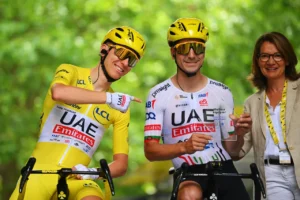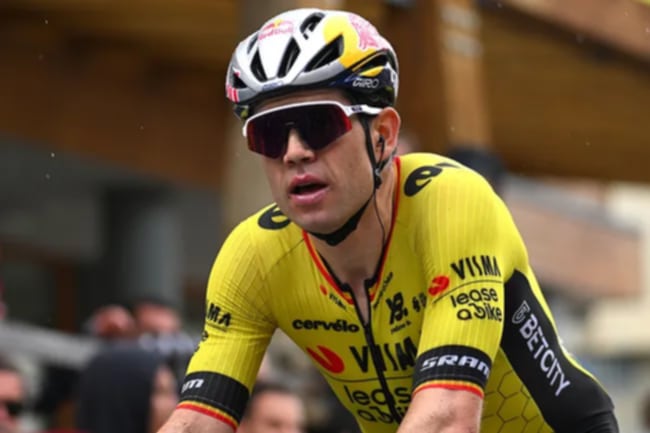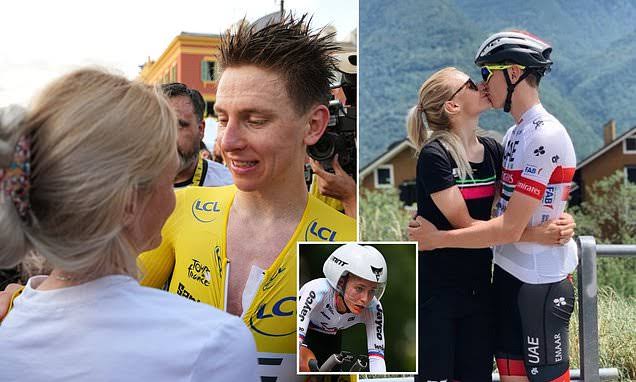**João Almeida: The Unsung Hero of This Year’s Stage Racing Scene and His Role as Pogačar’s Understudy at the Tour de France — What’s Next for UAE Team Emirates-XRG?**
In the world of professional cycling, each season often brings a new set of stars, surprises, and shifts in the peloton’s hierarchy. This year, one rider has distinguished himself through consistent excellence and sheer resilience: João Almeida. While many have been fixated on the perennial Tour de France favorites like Tadej Pogačar and Primož Roglič, Almeida’s performances have quietly but convincingly positioned him as arguably the best stage racer of the year.

Yet, despite his impressive form and mounting accolades, Almeida’s journey to the Tour de France remains fraught with complexities. He is set to participate in the grand tour as a supporting figure—Pogačar’s understudy—raising questions about the strategic direction of UAE Team Emirates-XRG and the future landscape of GC (General Classification) racing. What does this mean for Almeida, the team, and the broader peloton? And what are the next steps for a rider who has already proven he belongs among cycling’s elite?
Almeida’s Rise: The Best Stage Racer of the Year
Impressive Consistency and Versatility
João Almeida’s 2023 season has been marked by a series of remarkable performances across a variety of stage races. From the Giro d’Italia, where he demonstrated grit and tactical intelligence, to shorter stage races that showcased his explosive climbing and time-trial abilities, Almeida has consistently been at the forefront.
His ability to perform across different terrains—mountains, time trials, and breakaways—has made him a formidable all-rounder. Unlike specialists who excel only in specific areas, Almeida’s versatility has allowed him to adapt and excel in multiple race environments, earning him the reputation of one of the most complete stage racers currently active.
Results and Impact
While he may not have claimed a grand tour victory yet, Almeida’s results speak volumes. He has multiple top-five finishes in major races, including podium positions in stage races like Tirreno-Adriatico and the Volta a Catalunya. His climbing prowess has often put him in contention on tough mountain stages, and his time-trial performances have further solidified his GC credentials.
Perhaps most telling is the way he has accumulated points, gained respect from rivals, and garnered attention from cycling enthusiasts worldwide. His performances have challenged the traditional hierarchy and proved that Almeida is not merely a domestique or a secondary player but a genuine contender.
The Strategic Dilemma: Almeida as Pogačar’s Understudy
The Role of a Supporting Rider
Despite his impressive results, Almeida’s role at the Tour de France is set to be that of a support rider for Pogačar. Historically, UAE Team Emirates has built its GC ambitions around Pogačar, who has already secured multiple Tour de France jerseys and is considered one of the sport’s most talented climbers and all-rounders.
This strategic positioning raises an important question: with Almeida’s talent, could he or should he be the team’s primary leader? Or is there a broader team philosophy that prioritizes Pogačar’s ambitions, relegating Almeida to a secondary role?
The Impact on Almeida’s Career
For Almeida, this scenario presents a crossroads. Supporting Pogačar at the Tour de France provides invaluable experience, exposure, and the opportunity to learn from one of the best in the sport. Yet, it also risks delaying his quest for a grand tour victory, which many believe he is capable of achieving sooner rather than later.
Balancing team tactics, rider development, and personal aspirations is complex. The team’s decision to position Almeida as Pogačar’s understudy reflects a strategic choice rooted in the current competitive landscape, but it inevitably prompts questions about Almeida’s future leadership potential and whether he will get the chance to lead his own GC campaigns in the coming years.
What’s Next for João Almeida?
The Path Forward: Personal Ambitions and Team Strategy
Almeida’s immediate future will likely involve supporting Pogačar in the Tour de France, gaining valuable experience and enhancing his reputation as a team player. However, his long-term trajectory remains ripe with possibilities.
– **Gradual Leadership Development:** If Almeida continues to impress and develop, UAE Team Emirates might consider giving him more leadership responsibilities in upcoming races, especially in one-week stage races or lesser grand tours where he can target overall victory.
– **Seeking Opportunities Elsewhere:** Alternatively, if Almeida perceives that his chances of leading a GC at a top-tier team are limited, he might consider transferring to a squad where he can be the designated leader. Such a move could accelerate his quest for a grand tour win and establish him as a household name in the sport.
– **Building a Palmarès as a Support Rider:** Supporting Pogačar in the Tour de France and other races can also serve as a stepping stone. Learning from Pogačar’s racing style, tactics, and leadership qualities could prepare Almeida for greater responsibilities in the future.
The Broader Context: UAE Team Emirates-XRG’s Strategy
Assembling a GC-Contending Roster
UAE Team Emirates-XRG boasts an impressive roster of GC riders—Pogačar, Almeida, and others like Marc Soler and João Sosa. This depth offers tactical flexibility but also complicates leadership hierarchies.
The team’s approach appears to prioritize Pogačar’s ambitions, which makes strategic sense given his proven ability to win grand tours. However, this might lead to internal competition, potential rider dissatisfaction, or missed opportunities if talented riders like Almeida are primarily cast in support roles.
Managing Expectations and Development
To maximize their roster’s potential, UAE Team Emirates must strike a balance between supporting their established stars and nurturing emerging talents. Clear communication, strategic race selections, and individualized development plans are essential.
If Almeida’s talent continues to shine, the team might consider giving him more leadership opportunities in other races, gradually transitioning him from a support rider to a team leader in specific events.
The Future of Stage Racing and Almeida’s Place in It
João Almeida’s ascendancy signals a changing landscape in stage racing. His versatility and consistency suggest he could be a future grand tour winner, provided he gains the opportunity and the right team environment.
Meanwhile, the current strategy at UAE Team Emirates reflects a pragmatic approach—maximizing the potential of their top riders while managing internal dynamics. For Almeida, the next few seasons will be pivotal in establishing whether he can break free from the shadow of the sport’s current giants and carve out his own legacy.
João Almeida’s status as the best stage racer of this year underscores the depth of talent emerging in professional cycling. His performances have earned admiration and respect, positioning him as a genuine contender for grand tour glory.
However, his role as Tadej Pogačar’s understudy at the Tour de France highlights the complexities of team strategy and rider development. While Almeida’s immediate future involves supporting Pogačar’s quest for another yellow jersey, the long-term horizon is bright with possibilities.
What’s next for Almeida is not just about waiting in the wings but about seizing opportunities, making strategic decisions, and ultimately, defining his own path in cycling’s elite echelon. As UAE Team Emirates continues to build a powerhouse roster, Almeida’s journey will undoubtedly be one to watch—an inspiring story of patience, perseverance, and ambition in the peloton’s grandest stages.

